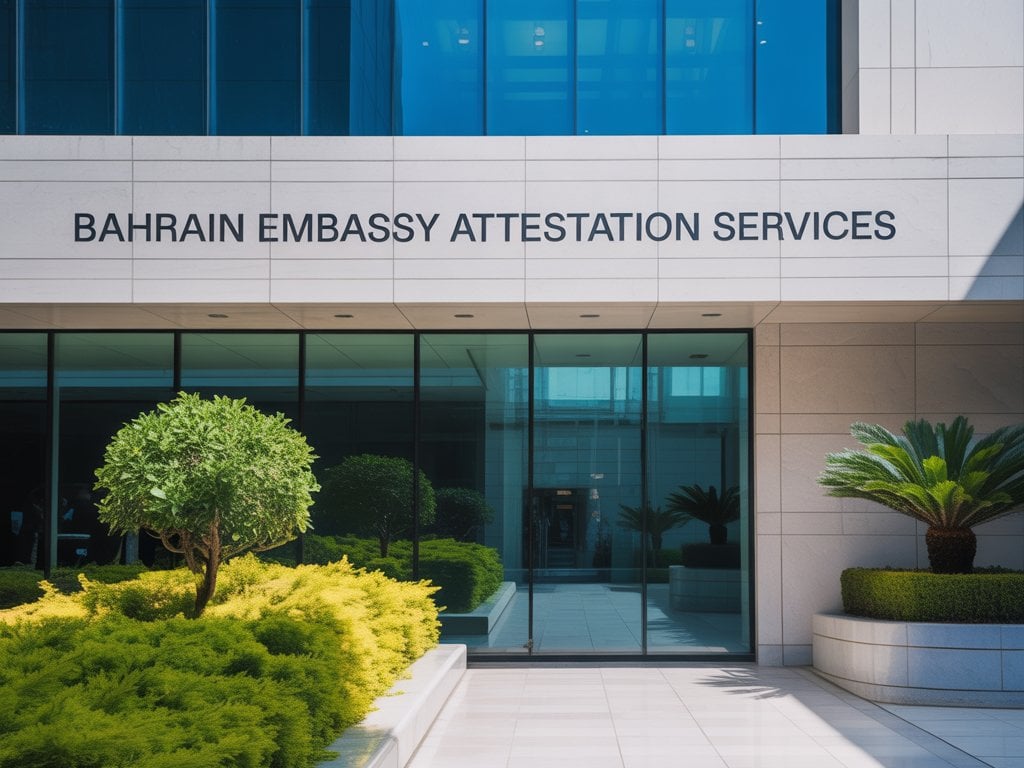Bahrain Embassy Attestation Guide for Documents
Explore our comprehensive guide on Bahrain embassy attestation, covering education, personal, and commercial document verification. Learn the essential steps for successful Bahrain document verification and attestation.
10/4/20257 min read


Introduction to Embassy Attestation
Embassy attestation serves as a crucial process for individuals and businesses requiring the recognition of their documents in foreign jurisdictions. This procedure involves verifying a document's authenticity through a designated embassy or consulate, ensuring that it fulfills the legal requirements of the country where it will be utilized. Understanding the nuances of embassy attestation is essential, particularly in contexts such as education, personal, and commercial documentation.
The significance of embassy attestation lies in its ability to facilitate the legal recognition of various documents. Whether it pertains to academic credentials, marriage certificates, or commercial contracts, attested documents are often a prerequisite for engaging in international activities, such as study abroad programs, immigration applications, or international trade agreements. The Bahrain embassy plays a pivotal role in this process by providing necessary verification and endorsement, ensuring that documents bear the requisite authenticity to be accepted abroad.
Failing to obtain the necessary embassy attestation can have serious consequences for both individuals and businesses. For students planning to study overseas or professionals seeking employment abroad, unverified documents may lead to delays in visa processing, as authorities may question their legitimacy. Similarly, businesses aiming to establish contracts or partnerships in foreign markets may find their efforts obstructed without proper document verification. Thus, understanding the importance of embassy attestation, particularly through the Bahrain embassy, is vital in preventing legal complications and ensuring smooth cross-border interactions.
Types of Documents Requiring Attestation
Attestation of documents by the Bahrain embassy is a crucial step in many processes, serving to authenticate a variety of document types. Understanding the categories of documents that typically require this formal verification can help individuals and organizations facilitate their dealings in Bahrain.
Firstly, education-related documents hold significant importance when it comes to attestation. This category includes degrees, diplomas, and academic transcripts. The validation of these documents is often a prerequisite for further studies, job applications, or professional licensing in Bahrain. Educational institutions and employers frequently request attested documents to ensure the credibility of the qualifications being presented.
Next, we have personal documents which also necessitate attestation. This category encompasses essential documents such as birth certificates, marriage licenses, and divorce decrees. Legal processes, including residency applications or citizenship requests, commonly require attested personal documents. The Bahrain embassy rigorously evaluates these records to ensure their authenticity, safeguarding the rights and privileges of individuals residing in or seeking to enter Bahrain.
Lastly, commercial documents, which include contracts, agreements, and business licenses, form another critical category requiring attestation. Businesses engaged in trade or services within Bahrain must often have their documents attested to comply with local regulations and facilitate smooth operations. Attestation underscores the legitimacy of the transactions and partnerships undertaken and is an essential process for foreign investors wishing to navigate the Bahraini market.
In summary, whether for education, personal, or commercial purposes, the attestation of documents through the Bahrain embassy is an integral step in ensuring their legal standing and acceptance in the country. This process helps validate documents across various sectors, facilitating smoother interactions and compliance with local laws.
The Attestation Process: Step-by-Step Guide
The attestation process for documents intended for use in Bahrain involves several important steps that ensure authenticity and legal recognition. Initially, individuals seeking attestation must have their documents verified by the relevant authorities within Bahrain. This includes educational credentials, personal documents, or commercial papers that require authentication. The initial verification establishes a foundational level of legitimacy, as documents without this step may not be accepted by the Bahrain embassy.
Once the preliminary verification is completed, the next step requires the preparation of necessary paperwork and fees. Applicants must gather all relevant documents, including the originals and any required copies, along with identification and application forms. Fees vary depending on the type of document being attested, and it is advisable to consult the official website of the Bahrain embassy for the most current fee structure and payment methods. Ensuring that all paperwork is complete will facilitate a smooth submission process.
The submission process to the Bahrain embassy serves as a critical stage in the attestation journey. Individuals can either submit their documents in person or, in some cases, opt for postal services, albeit at the university level or commercial institutions may follow. Upon submission, the embassy conducts a thorough review, which can take several days to weeks, depending on the volume of requests and the complexity of the documents. It is essential to remain patient during this waiting period, as rushing the process can lead to complications or delays.
In conclusion, understanding these steps is vital for a successful attestation experience, facilitating the use of important documents in Bahrain without unnecessary setbacks or misunderstandings.
Common Challenges and Solutions
When applying for Bahrain embassy attestation, applicants often encounter several common challenges that can complicate the process. One prevalent issue is document discrepancies. These discrepancies can arise from variations in names, inconsistencies in dates, or incomplete documentation. Such issues can lead to delays in processing, as the embassy may require additional documentation to verify accuracy. To mitigate this challenge, applicants are advised to meticulously review their documents prior to submission, ensuring that all information aligns and is correctly formatted according to Bahrain's requirements.
Another significant challenge is the lengthy processing times associated with embassy attestation. The attestation process can take several days or even weeks, depending on the volume of applications and the complexity of the documents submitted. This extended timeline can be particularly problematic for individuals who require their documents in a timely manner, such as for employment or educational opportunities. To address this issue, applicants should plan ahead, submitting their documents as early as possible. They may also inquire about expedited processing options that some embassies offer for urgent requests.
Language barriers can also pose challenges during the attestation process. Many applicants may not be fluent in Arabic or English, which can complicate the understanding of requirements or communications with embassy staff. To navigate this obstacle, it is advisable for applicants to seek assistance from bilingual individuals or professional translation services. Utilizing these resources can help ensure that all documents are accurately translated and that communications are clear and effective.
By recognizing these challenges and implementing the suggested solutions, applicants can streamline their experience with Bahrain embassy attestation, enhancing their chances of a successful outcome.
The Importance of Professional Help
When navigating the complex process of embassy attestation, seeking professional help can be immensely beneficial for individuals and businesses alike. The attestation process involves verifying key documents such as educational certificates, personal records, and commercial papers, which can be both time-consuming and intricate. Hiring experts in this field can ensure that these documents are processed efficiently, minimizing delays.
One of the foremost advantages of engaging professional services is the expedited processing of documents. Experts are familiar with the procedural requirements of the Bahrain embassy and can often expedite the submission and receipt of documents. This is especially critical for individuals and businesses that may be facing tight deadlines, such as securing employment overseas or finalizing international business agreements. By leveraging their experience, professionals can significantly reduce the time involved in the attestation process.
Moreover, accuracy is paramount when it comes to document attestation. Missteps or inaccuracies in the documentation can lead to delays or even rejection from the embassy. Professional attestation services provide assurance of accuracy by meticulously reviewing all submitted documents. This comprehensive verification helps to safeguard against errors that could complicate the process, offering peace of mind to those involved. Additionally, professionals stay abreast of the latest regulations and requirements that may impact the attestation process, which can frequently change.
Lastly, navigating the intricate landscape of embassy rules and regulations can be overwhelming without guidance. Professionals provide clear direction, demystifying the process for their clients. Their expertise allows individuals and businesses to focus on their principal activities while successfully managing the requirements associated with document attestation. Thus, seeking professional help emerges as a sound choice for anyone engaged in this essential process.
Embassy Attestation vs. Apostille: What's the Difference?
When it comes to the process of validating documents for use abroad, two prominent methods are embassy attestation and apostille. Although both methods serve the purpose of authenticating documents, they differ significantly in terms of applicability, process, and recognition across international borders.
Embassy attestation is a formal procedure where a document is verified by a particular country's embassy or consulate. This method is typically required for legal, educational, and commercial documents that are to be used in countries which do not recognize the apostille. Essentially, the embassy serves to verify that the document is legitimate and issued by an authorized entity within its jurisdiction. This means that an individual or business seeking to have a document attested by an embassy must follow specific procedures, which can vary based on the type of document and the policies of the embassy itself.
On the other hand, the apostille is a simplified form of authentication that is recognized under the Hague Convention of 1961. An apostille is used primarily for documents that will be presented in countries that are part of this convention, thereby allowing for a streamlined and efficient verification process. The apostille certifies that the document is genuine, thereby eliminating the need for further authentication by embassies of those participating countries. This makes the apostille particularly advantageous for individuals and organizations dealing with multiple countries that adhere to the Hague Convention.
In summary, the key differences between embassy attestation and apostille lie in their processes and regional recognitions. Embassy attestation retains relevance in countries outside the Hague Convention, whereas the apostille is favored for expediency in international dealings among member nations. Understanding which method to use for particular documents can save time and ensure compliance with foreign regulatory requirements.
Conclusion and Final Thoughts
In this guide, we have explored the intricacies of Bahrain Embassy Attestation, highlighting its significance in the realms of education, personal matters, and commercial transactions. The attestation process serves as a vital validation mechanism for various documents, ensuring their acceptance and credibility in Bahrain and beyond. Through embassy attestation, individuals and businesses can confirm the authenticity of their educational certificates, personal identification documents, and commercial agreements, allowing for smoother interactions and legal recognition in diverse contexts.
We have examined the essential steps involved in the attestation process, beginning with document preparation and verification, and culminating in the final submission to the embassy. By adhering to the outlined steps, including securing necessary certifications from pertinent authorities, applicants can facilitate a more efficient and hassle-free experience. It is imperative to understand that neglecting these steps can lead to unnecessary delays and complications, potentially jeopardizing important opportunities, whether they be related to employment, further education, or business ventures.
Moreover, the role of attestation extends beyond mere document verification. It plays a crucial part in fostering trust and reliability, particularly in international transactions where document authenticity is paramount. As globalization continues to reshape how we conduct business and personal affairs, the need for effective attestation processes becomes increasingly important. This underscores the necessity for individuals and organizations to prioritize embassy attestation in their plans when dealing with international jurisdictions.
In conclusion, understanding the intricacies of Bahrain Embassy Attestation not only streamlines personal and commercial endeavors but also ensures compliance with international standards. We encourage readers to approach the attestation process with diligence, as it is an essential gateway to successful engagement in today’s interconnected world.
